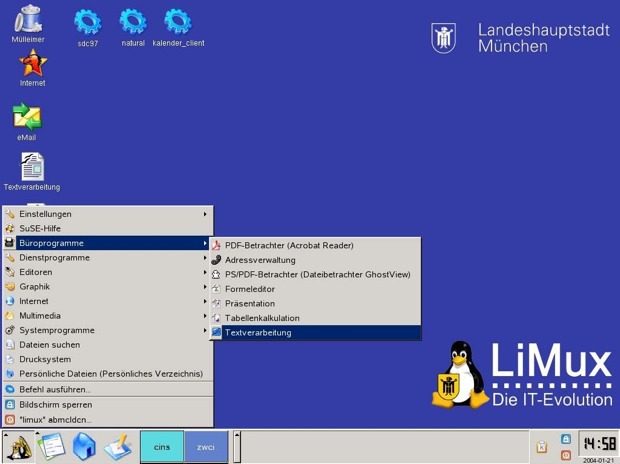Munich officials explain why they don’t like Linux
 Like a year ago , some representatives of the city administration of Munich propose to abandon the use of the operating system LiMux (based on Kubuntu 12.04) in public institutions. This decision is promoted by two members of the CSU Conservative Party. In their opinion, the current system is “difficult to use” and has “limited functionality.”
Like a year ago , some representatives of the city administration of Munich propose to abandon the use of the operating system LiMux (based on Kubuntu 12.04) in public institutions. This decision is promoted by two members of the CSU Conservative Party. In their opinion, the current system is “difficult to use” and has “limited functionality.”Two CSU party members who are members of the city’s IT committee published an open letter ( pdf in German) listing several specific reasons for not using Linux.
1) Lack of installed programs for editing texts, Skype, Office, etc., which interferes with the normal use of the computer.
2) The inability to set permissions for individual users limits their actions in the system.
')
Such reasons caused a natural surprise in the open source community, because all these functions are easy to implement in Linux. In general, LiMux brings with you a completely ready to use desktop environment based on open source software, including free office software OpenOffice, which work with the open format Open Document Format (ODF). This format has become the standard for office work in the city.

Recall that in November 2013, the Munich City Council completed a lengthy procedure for the migration of 15,000 computers to free software. The decision to abandon proprietary and very expensive Windows and Microsoft Office programs was made in 2003. After preparing, planning and retraining personnel, the city began to systematically transfer offices from Windows NT to its own distribution kit, LiMux. The procedure took ten years.
Munich is one of the first cities in Europe, which completely switched to free software and thereby saved more than 10 million euros from the city budget.
If the municipal services remained on Windows and Microsoft Office, then only for the renewal of licenses would have to pay 6.8 million euros. Plus, additional expenses of 4.7 million euros for upgrading equipment for new software. As a result, the total savings for the city budget amounted to 11.3 million euros.
The Windows scenario includes the cost of licenses for upgrading the OS, which occurs on the Microsoft infrastructure every three to four years and is practically mandatory. The estimate takes into account a hypothetical upgrade to Windows 7 and the new version of MS Office.
The cost of migrating to Linux turned out to be quite low. For seven years, only 273,132 euros have been spent for these purposes, which is just a penny compared to the cost of Windows licenses.
However, retraining of staff and work on installing new software had to spend 16.4 million euros. But these costs will pay off in the coming years.
Nevertheless, the Conservative Party appeals to the mayor of the city to order the return of the “familiar Windows” to the computers.
A response from the mayor has not yet followed, but independent observers see no signs of “mass discontent” of LiMux. Another interesting fact is that one of the two authors of the letter - Otto Seidl (Otto Seidl), an IT consultant and a Unix programmer - used to speak in support of free software and said that "Microsoft solutions are not ideal." It is completely incomprehensible why he changed his point of view.
Source: https://habr.com/ru/post/357516/
All Articles